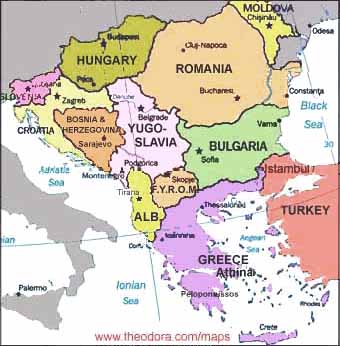.....
- | NEWS |
- Albania
- Bosnia and
Herzegovina - Bulgaria
- FYROM
- Greece
- Hungary
- Moldova
- Romania
- Slovenia
- Turkey
OBSERVER:
- Croatia
PENDING:
- Yugoslavia
- Feedback
.

Purpose
SECI's purpose is to encourage economic and environmental cooperation among the twelve countries of the region and to facilitate the access of Southeast Europe to European integration. It encourages participants in the region, and outsiders, to think of regional potentials, rather than the problems and prospects of individual states.
Members of the initiative are Albania, Bosnia-Herzegovina, Bulgaria, the Former Yugoslav
Republic of Macedonia (FYROM), Greece, Hungary, Moldova, Romania, Slovenia, and Turkey.
Croatia has observer status in SECI. The Federal Republic of Yugoslavia (FRY) was originally
asked to participate, and it will be reinvited to join SECI when the conditions necessitating the
withdrawal of its invitation to participate no longer exist.
Design of the Initiative
SECI seeks to provide a mechanism for the countries of Southeast Europe to cooperate on a
regional basis to solve transnational problems in the economic and environmental spheres.
The members of SECI will meet to identify economic and environmental problems that affect two
or more of the member states. This task will be fulfilled by the Agenda Committee, which will
meet in January to prioritize potential projects and to determine which projects should be
implemented first. SECI will focus on practical projects. It will identify bottlenecks in the
regional economy and find solutions. The projects can have a whole range of complexities, from
simple ones such as reducing delays in border crossings to complicated ones such as a natural gas
pipeline for the region.
Once priority projects have been determined, SECI will convene technical working groups to help
deal with these problems through improved planning, cooperation, sharing of information, and
attraction of private investment. At this stage, the United Nations Economic Commission for
Europe (ECE) will provide SECI with technical assistance and advice on project design.
SECI
hopes to receive the assistance of international financial institutions, the EU, the U.S., and other
interested parties on an ad hoc basis in relation to individual projects. SECI's efforts will be
coordinated by a High-Level Personality (HLP), to be named by the Chairman in Office of the
OSCE. The role of the HLP will be to follow up on the decisions taken by the representatives of
the participating states and to facilitate the implementation of projects. The U.S. will request that
the OSCE pay the salary of the HLP. The ECE has agreed to provide secretariat support (at an
as-yet undetermined level)
SECI should not be viewed as a source of new public funds and is not to create a new
bureaucracy. Moreover, SECI is not intended to duplicate other initiatives for regional
cooperation in southeastern Europe.
While the FRY is not currently a member, it will be asked to join SECI when the conditions
necessitating the withdrawal of its invitation to participate no longer exist. The mere participation
by the FRY in SECI will not by itself remove the outer wall of sanctions, nor by virtue of~its
SECI participation change the FRY's ineligibility for assistance.
U.S. Role in SECI
In addition to assisting SECI to become operational, the USG can help SECI fulfill its mission in
other ways. Specifically, we will look to other agencies to:
-- Provide expert personnel on temporary assignment to SECI working groups in
areas where they have expertise;
-- Support applications with international financial institutions for financing of SECI
projects;
-- Encourage the participation of U.S. businesses in the initiative.
US-backed SECI meeting in Athens focuses on SE transports (4/30/99 from ANA)
Representatives of 10 southeast European nations met in Athens
yesterday for the first tentative steps towards implementing a
US-brokered initiative to improve transports and commerce in a region
now dominating international headlines because of the Kosov o crisis.
A "memorandum of understanding" (MoU) was the product of the
Southeast European Cooperative Initiative (SECI) meeting, an idea
that Washington has promoted following the Dayton peace accords in
Bosnia, and ostensibly targets the "harmonisation of laws g overning
road transports" in the SE European region.
The event was hosted by Greece's transport ministry, and held at the
Athens seaside resort of Vouliagmeni.
US ambassador Richard Schifter, the chief SECI mediator and a
special adviser to the US secretary of state, afterwards answered one
of the most germane questions on most delegates minds, namely,
whether currently NATO-targetted Yugoslavia w ould at some point in
the future be invited to join.
Touching on the issue of why Washington is so interested in
southeastern Europe, an area including all of the Balkans, Schifter
pointed to the United States' intent to "promote peace" after the
Dayton accords through "facilitating cooperation" among the countries
in the region, while rejecting notions that the US was dictating
policy to countries on the European Union's doorstep.
"We did not make the rules, that was done by the nations of the
region," he said.
He also emphasised that both Greece and the EU were behind the
initiative, downplaying questions over whether SECI could conflict
with EU regulations, guidelines and the Schengen Pact.
"We're not duplicating what other people are doing. We thought it
would be useful to encourage a coming together in terms of geography.
We really want Europe to expand in the region, tomorrow in factÉwe're
not going to tell the EU what to do," he said, stressing that Greece
(an SECI member) Italy and Austria were involved, while the
Commission was also fully briefed on SECI.

